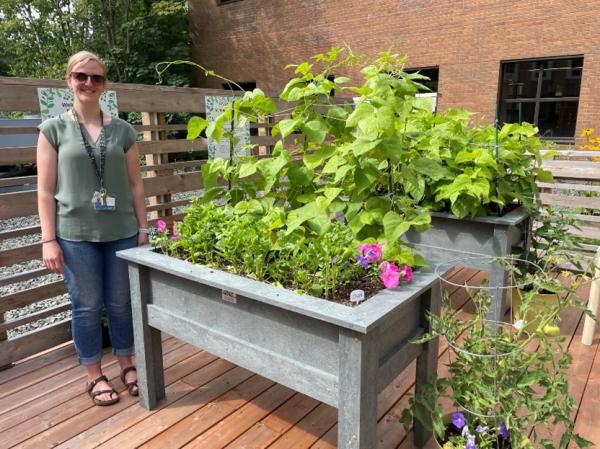Occupational Therapy Month Spotlight: Wellness garden helping people grow

Amelia Fletcher has brought her green thumb to work and in the process is helping patients and staff alike.
In 2022, Fletcher joined Nova Scotia Health to work as an occupational therapist in the Mental Health and Addictions Program, having worked at an inpatient psychiatry clinic in Dartmouth and a community outpatient program known as Beacon House in the western zone.
She is currently at the acute mental health day hospital at the Abbie J. Lane Memorial building in Halifax, where she has cultivated, among several different projects, an onsite ‘wellness garden’.
The patients work on the garden each day, which they use to help provide ingredients for a cooking group that Fletcher leads. The group also uses vegetables grown in the garden to cook meals once a month for Shelter Nova Scotia’s ‘Adopt-a-Meal’ program.
“The garden can be a great way to promote social skill development, finding new hobbies, supporting people who are managing food insecurity, or just connecting people to the therapeutic benefits of nature as well,” Fletcher said.
The project has allowed others to gain the same appreciation and love of gardening and nature that she has, but also has offered her an opportunity for a window into someone’s life.
“The thing I like the most about my role here at the Day Hospital is getting to know somebody and what their interests are and what their values are and helping them reconnect with that through different community-based activities or different types of hobbies and interests,” she said.
Fletcher grew up just outside Fredericton before moving to Halifax in 2019 to pursue a certificate in disability management, followed by a Master’s in occupational therapy at Dalhousie University.
Having worked as a kinesiologist for five years, Fletcher found herself becoming drawn to the field of occupational therapy, which offers a wide spectrum of services for people.
“Every job that I worked in or every program that I worked in there was always occupational therapists,” she said. “And I thought it was really interesting that no matter where I went to work there was somebody who had one degree and one type of training, but they had a skillset that could be applied in clinics or in hospitals or in rehab programs. I even worked a job as a kinesiologist with an OT where we worked in the woods and supported forestry workers and tree planters in managing their health at work.”
Her main duties in her current role include program development, group facilitation, and 1-1 interventions to support self-management and recovery skills.
It’s a job that is almost limitless in the ways you can apply your skills to help people.
“When people say ‘oh, occupational therapy, you must support people with work’. They hear the word occupation, but occupations are just really the things that we do all day,” she said.
“We support other people in participating in what’s meaningful to them based on how they define their daily life. So, for some people that’s working on their activities of daily living like grooming or hygiene. For other people that’s supporting them with participating in relationships or community organizations or leisure activities and for some people that looks like work.”
The entire experience since joining the Mental Health and Addictions Program has allowed her to become a better occupational therapist and person.
“It’s lead me to really appreciate all of the factors that can influence somebody’s mental health and it’s not always biology or genetics, there’s many social factors that are at play, from finances to housing to food insecurity to workplace satisfaction or family dynamics,” she said. “And my work in the Mental Health and Addictions Program has probably made me a more empathetic or patient person, I would say.”